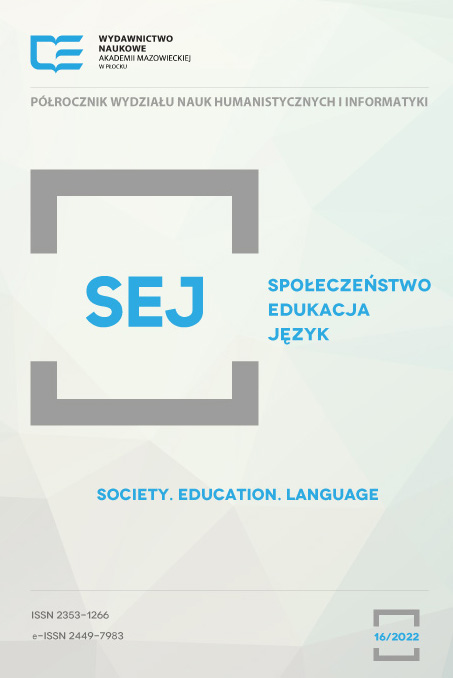THE NEWBORN IN THE MILLENNIAL FAMILY - A NEW PERSPECTIVE ON THE ROLE OF THE FATHER
DOI:
https://doi.org/10.19251/sej/2022.16(2)Keywords:
newborns, father's, millenials, infant care, familyAbstract
Introduction: There is little or even no discussion these days about the role of the millennial father in caring for the newborn child and how they contribute to that role.
Purpose: The purpose of this study is to analyze the role of the father in caring for the newborn and to assess how his position in the family has changed.
Material and methods: A questionnaire was anonymous and administered to a random sample of 169 fathers of newborns and consist 25 questions.
Results: In the study group, 95.2% of fathers know in which week their baby was born, family births are increasing. Fathers are involved in health care their child. They also provide pre-natal care for example attending a birthing school. They try to spend more and more time with their newborns.
Conclusion: The father of the millennial generation is increasingly knowledgeable and aware of his new role.
References
References
Ayala, A., Christensson, K., Christensson, E., Cavada, G., Erlandsson, K., & Velandia, M. (2021). Newborn infants who received skin-to-skin contact with fathers after Caesarean sections showed stable physiological patterns. Acta Paediatrica (Oslo, Norway : 1992), 110(5), 1461–1467. https://doi.org/10.1111/APA.15685
Baldwin, S., Malone, M., Sandall, J., & Bick, D. (2018). Mental health and wellbeing during the transition to fatherhood: a systematic review of first time fathers’ experiences. JBI Database of Systematic Reviews and Implementation Reports, 16(11), 2118–2191. https://doi.org/10.11124/JBISRIR-2017-003773
Chen, E.-M., Gau, M.-L., Liu, C.-Y., & Lee, T.-Y. (2017). Effects of Father-Neonate Skin-to-Skin Contact on Attachment: A Randomized Controlled Trial. Nursing Research and Practice, 2017, 1–8. https://doi.org/10.1155/2017/8612024
Dachman, R. S., Alessi, G. J., Vrazo, G. J., Fuqua, R. W., & Kerr, R. H. (1986). Development and evaluation of an infant-care training program with first-time fathers. Journal of Applied Behavior Analysis, 19(3), 221–230. https://doi.org/10.1901/JABA.1986.19-221
Dayton, C. J., Walsh, T. B., Oh, W., & Volling, B. (2015). Hush now baby: mothers’ and fathers’ strategies for soothing their infants and associated parenting outcomes. Journal of Pediatric Health Care : Official Publication of National Association of Pediatric Nurse Associates & Practitioners, 29(2), 145–155. https://doi.org/10.1016/J.PEDHC.2014.09.001
Erlandsson, K., Christensson, K., & Fagerberg, I. (2008). Fathers’ lived experiences of getting to know their baby while acting as primary caregivers immediately following birth. The Journal of Perinatal Education, 17(2), 28–36. https://doi.org/10.1624/105812408X298363
Tudiver, F. (1981). Fathers and childbearing: new dimensions. Canadian Family Physician Medecin de Famille Canadien, 27, 984–988. https://pubmed.ncbi.nlm.nih.gov/21289750/
Huerta, M. C., Adema, W., Baxter, J., Han, W. J., Lausten, M., Lee, R., & Waldfogel, J. (2014). Fathers’ Leave and Fathers’ Involvement: Evidence from Four OECD Countries. European Journal of Social Security, 16(4), 308–346. https://doi.org/10.1177/138826271401600403
Insana, S. P., Garfield, C. F., & Montgomery-Downs, H. E. (2014). A mixed-method examination of maternal and paternal nocturnal caregiving. Journal of Pediatric Health Care : Official Publication of National Association of Pediatric Nurse Associates & Practitioners, 28(4), 313–321. https://doi.org/10.1016/J.PEDHC.2013.07.016
Lewicka, M. (2020). Przemiany roli ojca we współczesnej kulturze. Implikacje pedagogiczne. Teologia i Moralność, 15(1(27)), 201–212. https://doi.org/10.14746/TIM.2020.27.1.13
Milenials: cechy pokolenia Y - BRIEF. (n.d.). Retrieved June 19, 2022, from https://brief.pl/milenials_cechy_pokolenia_y/
Petts, R. J., & Knoester, C. (2018). Paternity Leave-Taking and Father Engagement. Journal of Marriage and the Family, 80(5), 1144–1162. https://doi.org/10.1111/JOMF.12494
Petts, R. J., Knoester, C., & Waldfogel, J. (2020). Fathers’ Paternity Leave-Taking and Children’s Perceptions of Father-Child Relationships in the United States. Sex Roles, 82(3–4), 173–188. https://doi.org/10.1007/S11199-019-01050-Y
Prouhet, P. M., Gregory, M. R., Russell, C. L., & Yaeger, L. H. (2018). Fathers’ Stress in the Neonatal Intensive Care Unit: A Systematic Review. Advances in Neonatal Care : Official Journal of the National Association of Neonatal Nurses, 18(2), 105–120. https://doi.org/10.1097/ANC.0000000000000472
Redshaw, M., & Henderson, J. (2013). Fathers’ engagement in pregnancy and childbirth: evidence from a national survey. BMC Pregnancy and Childbirth, 13. https://doi.org/10.1186/1471-2393-13-70
Świderska, M. (2001) Ojciec w opiece i wychowaniu dziecka. Pedagogika Rodziny, 1/3/4 43-58
Sapountzi-Krepia, D., Lavdaniti, M., Dimitriadou, A., Psychogiou, M., Sgantzos, M., He, H.-G., Faros, E., & Vehviläinen-Julkunen, K. (2010). Fathers’ Feelings and Experience Related to their Wife/Partner’s Delivery in Northern Greece. The Open Nursing Journal, 4, 48–54. https://doi.org/10.2174/1874434601004010048
Schaber, R., Kopp, M., Zähringer, A., Mack, J. T., Kress, V., & Garthus-Niegel, S. (2021). Paternal Leave and Father-Infant Bonding: Findings From the Population-Based Cohort Study DREAM. Frontiers in Psychology, 12. https://doi.org/10.3389/FPSYG.2021.668028
Shapiro, A. F., Gottman, J. M., & Fink, B. C. (2020). Father’s Involvement When Bringing Baby Home: Efficacy Testing of a Couple-Focused Transition to Parenthood Intervention for Promoting Father Involvement. Psychological Reports, 123(3), 806–824. https://doi.org/10.1177/0033294119829436
Wesoły, W. (2013) Wychowawcza rola ojca w rodzinie - Studia Koszalińsko-Kołobrzeskie - Issue 20 (2013) - CEJSH - Yadda. http://cejsh.icm.edu.pl/cejsh/element/bwmeta1.element.desklight-2e4129a5-0d94-4873-bfee-be6b3954e836
Yoshida, S., & Funato, H. (2021). Physical contact in parent-infant relationship and its effect on fostering a feeling of safety. IScience, 24(7). https://doi.org/10.1016/J.ISCI.2021.102721
